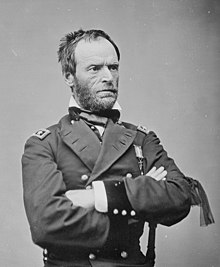 Global Information
Global InformationWilliam Tecumseh Sherman information
William Tecumseh Sherman | |
|---|---|
 Photograph by Mathew Brady of Sherman in Washington, D.C., in May 1865. The black ribbon of mourning on his left arm is for President Abraham Lincoln.[1] | |
| Commanding General of the U.S. Army | |
| In office March 4, 1869 – November 1, 1883 | |
| President |
|
| Preceded by | Ulysses S. Grant |
| Succeeded by | Philip Sheridan |
| Acting United States Secretary of War | |
| In office September 6, 1869 – October 25, 1869 | |
| President | Ulysses S. Grant |
| Preceded by | John Aaron Rawlins |
| Succeeded by | William W. Belknap |
| Personal details | |
| Born | February 8, 1820 Lancaster, Ohio, U.S. |
| Died | February 14, 1891 (aged 71) New York City, U.S. |
| Resting place | Calvary Cemetery, St. Louis, Missouri, U.S. |
| Political party | Republican |
| Spouse |
Eleanor Boyle Ewing
(m. 1850; died 1888) |
| Children | 8 |
| Relatives |
|
| Education | United States Military Academy (BS) |
| Signature | |
| Nicknames |
|
| Military service | |
| Branch/service |
|
| Years of service |
|
| Rank |
|
| Commands |
|
| Battles/wars | Second Seminole War
|
| Awards | Thanks of Congress (February 19, 1864, and January 10, 1865)[3] |
William Tecumseh Sherman (/tɪˈkʌmsə/ tih-KUM-sə;[4][5] February 8, 1820 – February 14, 1891) was an American soldier, businessman, educator, and author. He served as a general in the Union Army during the American Civil War (1861–1865), achieving recognition for his command of military strategy as well as criticism for the harshness of the scorched-earth policies that he implemented against the Confederate States.[6] British military theorist and historian B. H. Liddell Hart declared that Sherman was "the most original genius of the American Civil War" and "the first modern general".[7][8]
Born in Ohio into a politically prominent family, Sherman graduated in 1840 from the United States Military Academy at West Point. He interrupted his military career in 1853 to pursue private business ventures, without much success. In 1859, he became superintendent of the Louisiana State Seminary of Learning & Military Academy (now Louisiana State University), a position from which he resigned when Louisiana seceded from the Union. Sherman commanded a brigade of volunteers at the First Battle of Bull Run in 1861 before being transferred to the Western Theater. He was stationed in Kentucky, where his pessimism about the outlook of the war led to a breakdown that required him to be briefly put on leave.[9] He recovered and forged a close partnership with General Ulysses S. Grant. Sherman served under Grant in 1862 and 1863 in the Battle of Fort Henry and the Battle of Fort Donelson, the Battle of Shiloh, the campaigns that led to the fall of the Confederate stronghold of Vicksburg on the Mississippi River, and the Chattanooga campaign, which culminated with the routing of the Confederate armies in the state of Tennessee.
In 1864, when Grant went east to serve as the General-in-Chief of the Union Armies, Sherman succeeded him as the commander in the Western Theater. He led the capture of the strategic city of Atlanta, a military success that contributed to the re-election of President Abraham Lincoln. Sherman's subsequent famous "March to the Sea" through Georgia and the Carolinas involved little fighting but large-scale destruction of military and civilian infrastructure, a systematic policy intended to undermine the ability and willingness of the Confederacy to continue fighting. Sherman accepted the surrender of all the Confederate armies in the Carolinas, Georgia, and Florida in April 1865, but the terms that he negotiated were considered too generous by U.S. Secretary of War Edwin Stanton, who ordered General Grant to modify them.
When Grant became President of the United States in March 1869, Sherman succeeded him as Commanding General of the Army. Sherman served in that capacity from 1869 until 1883 and was responsible for the U.S. Army's engagement in the Indian Wars. He steadfastly refused to be drawn into party politics and in 1875 published his memoirs, which became one of the best-known first-hand accounts of the Civil War.[10]
- ^ Lewis 1993, p. i.
- ^ "William T. Sherman Family papers". University of Notre Dame Archives. University of Notre Dame. Retrieved January 2, 2022.
- ^ Official Army Register for January, 1885. Washington, D.C.: Adjutant General's Office. 1885. p. 265.
- ^ "Tecumseh". Dictionary.com Unabridged (Online). n.d.
- ^ "Tecumseh". The American Heritage Dictionary of the English Language (5th ed.). HarperCollins.
- ^ Woodworth 2005, p. 631: "[Sherman's] genius [for] strategy and logistics ... made him one of the foremost architects of Union victory"
- ^ Liddell Hart 1993, pp. xiii, 430.
- ^ Ricks, Thomas E. (June 15, 2016). "'William Tecumseh Sherman,' by James Lee McDonough". The New York Times. Retrieved February 5, 2022.
- ^ Dobbs, David. "Madness, Genius, & Sherman's Ruthless March". Wired. ISSN 1059-1028. Retrieved December 30, 2021.
- ^ Woodward 1990.